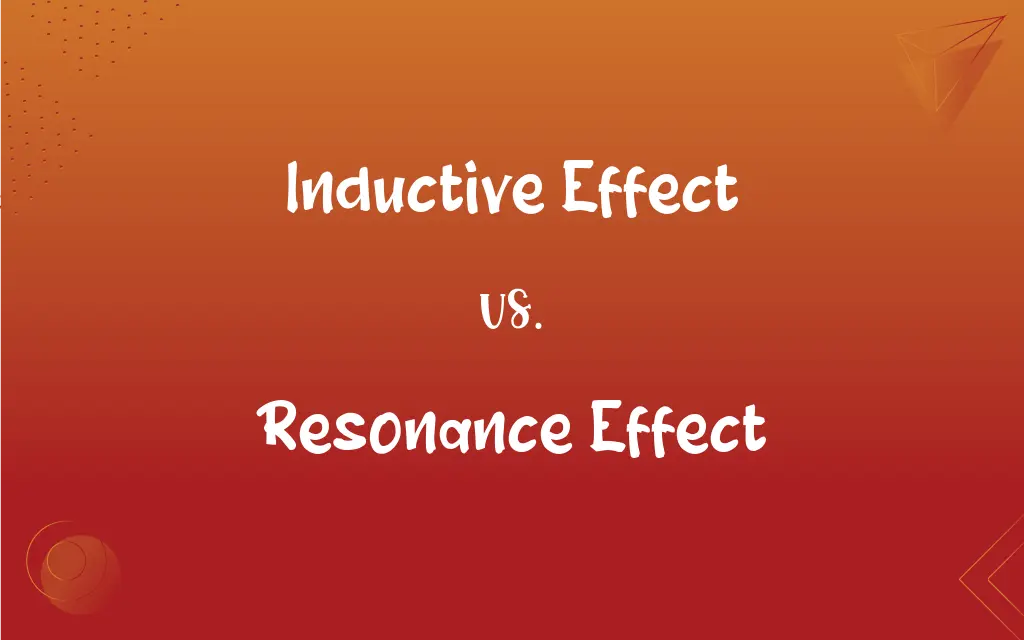Inductive Effect vs. Resonance Effect: What's the Difference?
Edited by Aimie Carlson || By Janet White || Published on January 15, 2024
Inductive Effect is a permanent polarization of sigma bonds due to electronegativity differences. Resonance Effect is delocalization of electrons through pi bonds or lone pairs in a molecule.

Key Differences
The inductive effect refers to the electron-donating or withdrawing ability of substituents through sigma bonds due to electronegativity differences. In contrast, the resonance effect involves the delocalization of electrons through pi bonds or adjacent lone pairs, influencing molecular stability and reactivity.
In inductive effect, electron density shifts along the chain of atoms in a molecule, altering electron distribution without creating new electron paths. On the other hand, the resonance effect redistributes electrons across multiple structures, representing different electron arrangements.
The inductive effect is distance-dependent, diminishing with increasing distance from the substituent. Conversely, the resonance effect is not significantly distance-dependent, as it involves electron delocalization over a larger molecular framework.
Inductive effect is a permanent effect in a molecule, irrespective of external factors. In contrast, resonance effect often manifests in response to specific molecular interactions, such as bond formation or breaking.
In terms of chemical reactivity, the inductive effect influences the acidity or basicity of compounds subtly. Meanwhile, the resonance effect plays a more significant role in determining the stability and reactivity of intermediates in reactions.
ADVERTISEMENT
Comparison Chart
Nature of Electron Movement
Through sigma bonds
Through pi bonds or lone pairs
Dependence on Distance
Decreases with distance
Not significantly affected by distance
Effect on Molecular Stability
Less impact compared to resonance
Greater impact, stabilizes charged structures
Involvement in Chemical Reactions
Minor influence on reactivity
Major influence on reactivity and intermediates
Types of Molecules Affected
Primarily in alkyl chains with substituents
Common in aromatic and conjugated systems
ADVERTISEMENT
Inductive Effect and Resonance Effect Definitions
Inductive Effect
Polarization of sigma bonds in a molecule.
The inductive effect in ethyl fluoride polarizes the C-F bond.
Resonance Effect
Stabilization through alternate electron arrangements.
Carboxylate ions are stabilized by the resonance effect.
Inductive Effect
Permanent electron redistribution in covalent bonds.
The inductive effect in phenol increases its acidity.
Resonance Effect
Redistribution of electrons in multiple structures.
The resonance effect in nitrate ion allows charge distribution.
Inductive Effect
Electronegativity-based electron movement in molecules.
Alkyl halides exhibit inductive effect due to halogen electronegativity.
Resonance Effect
Pi electron movement across adjacent atoms.
The resonance effect in phenolate ion increases its basicity.
Inductive Effect
Substituent-driven electron density shift.
In isopropanol, the inductive effect of the methyl group influences its properties.
Resonance Effect
Electron delocalization in conjugated systems.
Benzene's stability is due to the resonance effect.
Inductive Effect
Electron shift due to electronegativity difference.
In chloromethane, the inductive effect causes electron shift towards chlorine.
Resonance Effect
Electron sharing in molecules with conjugation.
Aromatic compounds exhibit resonance effect, contributing to their unique properties.
FAQs
What is the inductive effect?
A permanent electron shift in molecules due to electronegativity differences.
How does the resonance effect work?
It involves electron delocalization in systems with conjugated pi bonds or lone pairs.
Is the inductive effect distance-dependent?
Yes, its influence decreases with increasing distance from the substituent.
Can the resonance effect stabilize molecules?
Yes, it can significantly stabilize molecules by delocalizing electrons.
Does the inductive effect impact acidity?
Yes, it can subtly affect the acidity of molecules.
Is resonance a permanent effect?
Resonance is a characteristic feature of certain molecules, especially aromatic compounds.
Are resonance structures real?
They are theoretical constructs to represent electron delocalization.
Does resonance affect molecular geometry?
Yes, it can influence molecular geometry by allowing electron distribution over different structures.
How does the inductive effect influence reactivity?
It can affect reactivity subtly, mainly influencing electron-rich or deficient sites.
Can inductive effect occur in nonpolar molecules?
It is less pronounced in nonpolar molecules due to minimal electronegativity differences.
What types of molecules exhibit inductive effects?
Molecules with polarized sigma bonds, typically with electronegative substituents.
Is inductive effect relevant in organic chemistry?
Yes, it's crucial in understanding reactivity and properties of organic compounds.
Are all resonance structures equally important?
No, some structures can contribute more to the resonance hybrid based on stability.
Is the inductive effect always a withdrawing phenomenon?
No, it can be either electron-withdrawing or donating.
What role does resonance play in chemical reactions?
It often determines the stability and reactivity of reaction intermediates.
Can resonance effect predict physical properties?
Yes, it can help in predicting properties like boiling point, stability, and reactivity.
Does resonance require specific conditions to occur?
It requires conjugated systems with alternating double bonds or lone pairs.
Is the resonance effect observable in all organic compounds?
No, it's primarily observed in conjugated and aromatic compounds.
How does electronegativity relate to inductive effect?
Higher electronegativity leads to a stronger inductive effect.
How does inductive effect affect functional groups?
It influences the electron density around functional groups, altering reactivity.
About Author
Written by
Janet WhiteJanet White has been an esteemed writer and blogger for Difference Wiki. Holding a Master's degree in Science and Medical Journalism from the prestigious Boston University, she has consistently demonstrated her expertise and passion for her field. When she's not immersed in her work, Janet relishes her time exercising, delving into a good book, and cherishing moments with friends and family.
Edited by
Aimie CarlsonAimie Carlson, holding a master's degree in English literature, is a fervent English language enthusiast. She lends her writing talents to Difference Wiki, a prominent website that specializes in comparisons, offering readers insightful analyses that both captivate and inform.







































































